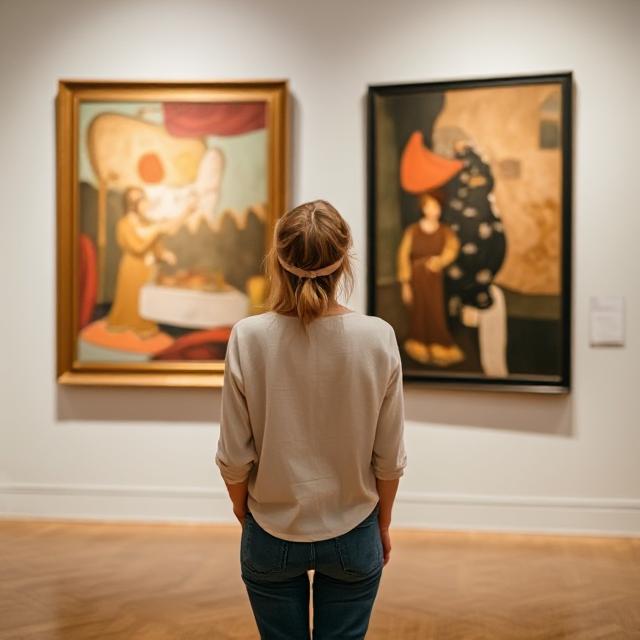A quiet reclaiming of who she was:
Jenna Rae was seventeen when her mother shattered her world.
She had always been a quiet, artistic girl growing up in a small Alberta town. Her sketchbooks were filled with wildflowers and imagined landscapes, and her poetry lived in the margins of her notebooks. Her mother, Lorraine, was a woman of sharp edges—elegant, ambitious, and emotionally distant. Jenna spent her childhood trying to earn her affection, mistaking criticism for care.
On the night of her high school art showcase, Jenna had poured her heart into a painting—a vivid portrait of a girl blooming from cracked soil. Lorraine arrived late, glanced at the canvas, and said, “You call that art? You’ll never make anything of yourself if you keep chasing these childish dreams.” Jenna didn’t cry. She didn’t argue. She simply stopped drawing. Something inside her went quiet, then cold.
Over the years, Jenna built walls so high no one could scale them. She moved to Calgary, studied business instead of art, and became ruthlessly efficient. She didn’t do birthdays. She didn’t do apologies. She didn’t do vulnerability. Friends drifted away, confused by her sarcasm and emotional detachment. Romantic relationships fizzled—she treated affection like a threat. Her coworkers respected her, but whispered behind closed doors: “She’s brilliant, but cold.”
She kept her mother at arm’s length. Their phone calls were brief, transactional. Lorraine never apologized. Jenna never asked her to.
One rainy October morning, Jenna received a call from a hospital in Edmonton. Lorraine had suffered a stroke. By the time Jenna arrived, her mother was gone. Standing in the sterile room, Jenna felt nothing. No tears. No rage. Just a hollow ache. She stared at her mother’s lifeless face, searching for the woman who had once braided her hair and then broke her spirit.
At the funeral, Jenna didn’t speak. She watched others cry, offer stories, share regrets. She felt like a ghost among mourners.
In the weeks that followed, Jenna spiraled. She stopped showing up to work. Her apartment became a mess of unopened mail and empty bottles. She ignored calls. Pushed away the few people who still tried. One night, she found herself sitting on the floor, surrounded by old boxes from her childhood. Inside one was a sketchbook—her teenage drawings, faded but still vibrant. Tucked between the pages was a note in her mother’s handwriting:
“You’re more talented than I ever knew how to say. I was scared you’d outgrow me. I’m sorry I didn’t know how to love you better.”
Jenna stared at the words, her hands trembling. The apology she’d waited for had come too late. And yet, it cracked something inside her. She broke down. Sobbed until her chest ached. Not just for her mother—but for the girl she used to be. For the years lost to bitterness. For the love she never let herself feel.
Jenna hadn’t answered her phone in days. Her voicemail was full, her inbox unread. The blinds in her apartment were drawn tight, and the air inside felt like it hadn’t moved in weeks. She lay on the couch in the same clothes she’d worn for three days, surrounded by empty mugs and unopened mail. The silence was thick, but familiar. It was the kind of silence she’d grown used to—one that didn’t ask questions or offer comfort.
Then came the knock.
It was soft at first. Then firmer. Jenna didn’t move.
“Jenna,” came the voice. “It’s me.”
She closed her eyes. Maya. Of course it was Maya. The one person who hadn’t given up on her, even when Jenna had made it nearly impossible to stay.
“I brought food,” Maya said. “And I’m not leaving it out here to get cold.”
Jenna didn’t answer. But after a long pause, she heard the sound of the spare key turning in the lock. Maya stepped inside, slowly, like she was entering a sacred space or a battlefield—maybe both.
The apartment was dim. Maya didn’t comment on the mess. She didn’t flinch at the smell of stale coffee or the stack of unopened condolence cards on the counter. She just walked to the kitchen, set down a container of soup, and then sat on the edge of the armchair across from Jenna.
For a while, neither of them spoke.
Jenna stared at the ceiling. Maya stared at her.
“You look like hell,” Maya said gently.
Jenna let out a dry laugh. “Thanks.”
“I mean it in the most loving way possible.”
Another silence. Then Maya leaned forward, her voice low.
“I know you don’t want to talk. I know you’re angry. And hurt. And tired. But I’m here. Not because I think I can fix anything. Just because I love you. And I’m not going anywhere.”
Jenna’s throat tightened. She wanted to say something cruel, to push Maya away like she always did. But the words didn’t come. Instead, her eyes filled with tears—hot, sudden, and uncontrollable.
She covered her face with her hands and sobbed. Not the quiet kind. The kind that wracked her body, that made her feel like she was breaking open.
Maya didn’t move. She didn’t speak. She just sat there, letting Jenna fall apart in front of her.
When the sobs finally slowed, Jenna looked up, her face blotchy and wet.
“I don’t know how to forgive her,” she whispered.
Maya nodded. “You don’t have to. Not yet. Maybe not ever. But you do have to live. And you don’t have to do it alone.”
The soup was gone. Maya had left hours ago, quietly, without asking for anything in return. She didn’t say “call me” or “let me know how you’re doing.” She just hugged Jenna gently, like she was holding something cracked but still precious, and said, “I’ll be back tomorrow.”
Jenna sat in the quiet afterward, staring at the empty bowl. It was the first real meal she’d had in days. Her body felt heavy, like it had finally remembered it existed.
She wandered into her bedroom, pulled the sketchbook from the box again. The note from her mother was still tucked between the pages. She read it again, slower this time. The words didn’t heal her. They didn’t erase the years of silence or the sting of that night at the art showcase. But they stirred something—a question she hadn’t let herself ask.
What if she didn’t have to carry all of this alone?
That night, she couldn’t sleep. Her mind kept circling the same thoughts: the funeral, the sketchbook, Maya’s quiet presence, the way her chest had cracked open when she cried. She wasn’t okay. She hadn’t been okay for years. And for the first time, she admitted it—not to anyone else, but to herself.
The next morning, she sat at her kitchen table with her laptop open. Her fingers hovered over the keyboard. She typed “grief counseling Calgary.” Then deleted it. Then typed “trauma therapy.” Then stared at the screen for twenty minutes.
She clicked on a link. A local clinic. Clean website. Soft colors. A photo of a woman smiling gently, arms crossed, beneath the words: “You don’t have to do this alone.”
Jenna almost closed the tab. Her stomach twisted. She wasn’t the kind of person who asked for help. She was the one who survived. Who pushed through. Who didn’t cry in public.
But she wasn’t surviving anymore. She was sinking.
She filled out the contact form. Name. Email. Reason for seeking therapy. She hesitated, then typed:
“My mother passed away recently. I’m not grieving. I’m angry. I’ve been angry for a long time. I think I need help.”
She hit send before she could talk herself out of it.
The clinic replied the next day. Her first appointment was scheduled for Thursday at 2:00 p.m.
When the day came, Jenna sat in the waiting room, her hands clenched in her lap. She almost left. Twice. But when the therapist called her name, she stood up.
She walked into the room. Sat down. And when asked, “What brings you here?” she didn’t know where to begin.
So she started with the painting. The one her mother dismissed. The one she never finished.
And for the first time, someone listened without judgment.
That night, Jenna wrote in her journal for the first time in years. Not poetry. Just fragments. Thoughts. Memories. One entry read: “I think I miss who I used to be. Before I learned to be cruel.”
Through therapy. She learned that forgiveness isn’t a gift you give someone else—it’s a release you give yourself. She didn’t forgive her mother overnight. But she began to understand her. To see the fear behind the cruelty. The wounds behind the walls.
Slowly she started to make changes, she reached out to Maya and invited her over. They didn’t talk about the past. They watched a movie, shared takeout, and laughed—tentatively, like testing the strength of a bridge rebuilt.
At work, Jenna apologized to a colleague she’d snapped at months ago. It was awkward. But the woman smiled and said, “Thanks. That means a lot.”
Jenna started painting again. Her first canvas was a mess—muddy colors, jagged lines. But she didn’t throw it away. She hung it on her wall. A reminder that healing wasn’t pretty, but it was hers.
She began to notice her own patterns. How she flinched at compliments. How she braced for rejection even when none was coming. In therapy, she unpacked those reflexes. Named them. Questioned them.
She didn’t forgive her mother. Not yet. Maybe not ever. But she stopped letting Lorraine’s voice live rent-free in her head. When the old criticisms echoed—“You’ll never make anything of yourself”—Jenna would pause, breathe, and whisper back, “That’s not mine to carry anymore.”
She started sleeping better. Eating better. She bought herself flowers one Friday afternoon, just because she liked the color.
And one day, while walking past a community center, she saw a flyer for an art class. She stood there for a long time. Then she signed up.
The class was small. Mostly retirees and hobbyists. Jenna didn’t share much. But she painted. And when someone complimented her work, she smiled and said, “Thank you,” without deflecting.
It wasn’t a transformation. It was a slow thaw. A quiet reclaiming.
Jenna wasn’t healed. But she was healing.
And for the first time in years, she believed that was enough.



